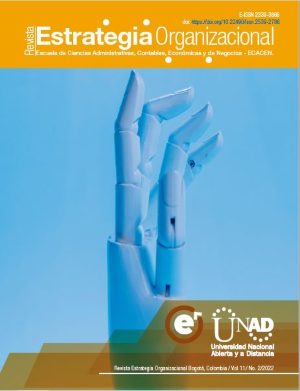Derechos de autor 2022 Revista Estrategia Organizacional

Esta obra está bajo una licencia internacional Creative Commons Atribución-NoComercial-CompartirIgual 4.0.
Revista
La revista proporciona acceso abierto inmediato a su contenido, basado en el principio de ofrecer al público un acceso libre a las investigaciones y colaborar a un mayor intercambio global de conocimiento.
Por tanto se acoge a la Licencia Creative Commons 4.0 Atribuciones Reconocimiento – NoComercial – CompartirIgual (by-nc-sa): No se permite un uso comercial de la obra original ni de las posibles obras derivadas, la distribución de las cuales se debe hacer con una licencia igual a la que regula la obra original. Para ver más dirigirse a: http://creativecommons.org/licenses/by-nc-sa/4.0/
La revista permite el autoarchivo después de publicado con la versión editada por la revista tanto en Web personales como repositorios institucionales y de área de conocimiento, siempre y cuando se realice la cita directa a la revista y se de el URL que dirige al artículo en el espacio Web de la revista. No solicita ningún tipo de embargo de los contenidos gestionados.
Para toda gestión la Revista Estrategia Organizacional se acoje al Código de Conducta COPE para Editores de Revistas y algunas Directrices sobre las Mejores Prácticas de COPE. Se recomienda leer el Código de ética en la sección sobre la revista. (Ver código)
Autor
Los contenidos de los artículos deben ser inéditos, no deben estar en evaluación en otra institución, el contenido no puede ser enajenado de terceros, no deben tener limitación legal o contractual que le prohiba autorizar su publicación en acceso abierto y medio impreso o digital.
La consecución de derechos de reproducción de todo el material gráfico es responsabilidad de los autores. Por ello, deben enviar las autorizaciones para la publicación y uso de ese material
Cada autor debe firmar la Carta de Cesión de Derechos a favor de la Universidad Nacional Abierta y A Distancia (UNAD) y la Revista Estrategia Organizacional.
Los autores de los artículos seleccionados para publicación deben leer y conocer el código de ética de la revista. En todos los casos el Editor y Comité editorial declaran que las opiniones expuestas son exclusividad y responsabilidad de los autores.
Política de preservación
La Revista Estrategia Organizacional preserva archivos a través de los servidores de la hemeroteca de la UNAD con la plataforma OJS. Este posee la herramienta PKP PLN que permite preservar el contenido de la revista independientemente de donde se encuentre alojado. Gracias a la Red privada de LOCKSS. Se puede ampliar la información en: https://pkp.sfu.ca/2016/08/08/pkp-lockss-pln-update
Adicionalmente, la revista cuenta con protocolos de interoperabilidad OAI-PMH: Open Archives Initiative-Protocol for Metadata Harvesting. Los detalles pueden consultarse en el siguiente link: https://hemeroteca.unad.edu.co/index.php/revista-estrategica-organizacio/oai.
Análisis de las Fintech y su aporte a la inclusión financiera en Colombia
La transformación digital ha permeado todas las esferas de la economía y el sector financiero no ha sido la excepción; los cambios constantes en los hábitos de los consumidores financieros requieren que los procesos en este campo sean digitalmente eficientes y en el menor tiempo posible. Este proceso de evolución de las entidades financieras tradicionales hacia las Fintech se da como consecuencia de la crisis financiera mundial del 2008, que provocó incertidumbre e incredulidad hacia los procesos tradicionales que enmarca el sistema financiero. Es así que ahora las compañías de inversión y de riesgo encuentran atractivas inversiones en este sector que en el 2019 se han invertido más de 8.000 millones de dólares en este tipo de startups. El sector Fintech está generando diferentes opciones de servicios para toda la población tanto bancarizada como no bancarizada además de empresas y el sector financiero tradicional se convierte en un aliado estratégico a través de sinergias que permiten ofrecer un abanico de servicios que buscan satisfacer las necesidades de los consumidores financieros.
En este artículo se presenta la definición y evolución de las Fintech y tiene como objetivo determinar si ha sido importante su alianza con las instituciones financieras colombianas en el desarrollo de la inclusión financiera. Al final, se identifican cuáles serían los retos para lograr el cumplimiento de los objetivos de desarrollo sostenible relacionados con la inclusión financiera. La metodología está basada en una exploración documental a partir de fuentes secundarias y análisis de encuestas e informes presentados por organismos multilaterales relacionados con la inclusión financiera, Fintech e instituciones financieras.








